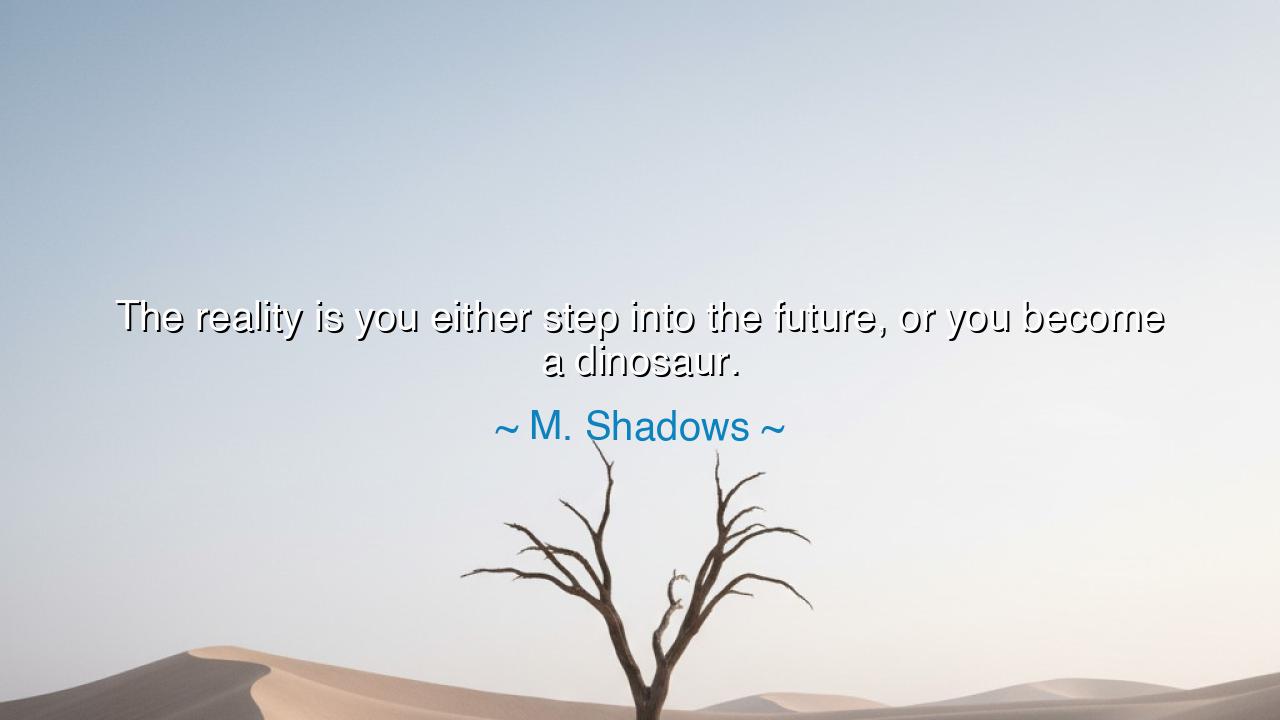
The reality is you either step into the future, or you become a






In the turbulent currents of time, the greatest civilizations and leaders have always faced a pivotal question: to embrace the future and its challenges, or to cling to the past, refusing to adapt and evolve. M. Shadows, in his words, "The reality is you either step into the future, or you become a dinosaur," captures the essence of this eternal struggle. The choice between moving forward and becoming irrelevant is not just a matter of personal will, but one that defines the very course of civilizations, individuals, and even entire societies. The metaphor of the dinosaur, once the king of the earth, now extinct, reminds us that progress is inevitable, and those who do not adapt risk fading into obscurity.
The ancients understood the vital importance of adaptation and progress. In the Roman Empire, rulers like Julius Caesar were not just conquerors but visionaries who recognized that the world was always in motion. Caesar, in particular, understood the importance of adapting to new circumstances, whether in the military, politics, or governance. His crossing of the Rubicon, the decision to march on Rome and defy the Senate, was not just an act of defiance—it was a calculated step into an uncertain future, one where he could either rise to power or be left behind in the sweep of history. In this sense, Caesar chose the future, rejecting the old ways of Senate rule and embracing the change that would ultimately reshape Rome. Like Caesar, M. Shadows’ words urge us to step boldly into the future, rather than becoming the relics of a bygone era.
Similarly, consider Alexander the Great, whose conquests spread Greek culture and philosophy across vast regions. Yet, it wasn’t just his military might that set him apart; it was his vision of a world united by common ideas and values. He understood that change—cultural, political, and technological—was the essence of human progress. Alexander could have stayed in his homeland of Macedonia, satisfied with his smaller, more comfortable world. But he chose to expand, to evolve, to embrace the unknown and to shape the future. Had he clung to the past, he would have become nothing more than another ancient king, eclipsed by time. Instead, his decision to embrace change made him a legend, someone whose influence was felt for generations.
The lesson of history is clear: to survive, to thrive, and to leave a legacy, one must embrace the future. The Renaissance, a period of intellectual rebirth, offers another vivid example of this principle. Think of Leonardo da Vinci, whose insatiable curiosity and desire for innovation led him to explore engineering, anatomy, and aviation, long before these fields were understood by his contemporaries. Da Vinci was not bound by the limitations of the past; he pushed the boundaries of knowledge, continually adapting his understanding to the ever-changing world around him. Like Leonardo, M. Shadows urges us to abandon the comfort of the old and to reach toward what is new, uncertain, and full of potential.
In contrast, the dinosaurs, the symbol of stagnation and eventual extinction, remind us of the fate that awaits those who refuse to evolve. Their once-dominant reign was wiped out because they were unable to adapt to a rapidly changing environment. In the ancient world, many great empires fell because they clung too tightly to their traditions, their past glories, and their outdated ways of doing things. The Byzantine Empire, for instance, survived for over a thousand years, but its eventual decline was marked by an inability to embrace the changing military tactics, economic systems, and cultural shifts of the time. Instead of evolving with the world around them, they became like the dinosaurs—powerful in their time, but unable to survive in a world that had moved on.
M. Shadows' statement, then, is not just a call to personal growth but a warning: the future waits for no one, and those who hesitate or refuse to change will find themselves left behind. To live fully, to lead, and to create, we must be willing to shed our old skins, to adapt, and to learn. The world is constantly evolving, whether we choose to acknowledge it or not. In today’s age of technology, social change, and global connectivity, this lesson is even more urgent. Those who adapt to new challenges and embrace the future will find themselves at the forefront of progress. Those who do not will, like the dinosaurs, be forgotten—fossils of an era that has passed.
The lesson for us, then, is clear. To avoid becoming dinosaurs in our own lives, we must embrace the future, adapt to change, and boldly step forward. Whether in business, relationships, or personal growth, we must be open to new ideas, new technologies, and new possibilities. The future is not something to fear, but something to embrace—an opportunity to create, to innovate, and to build a better tomorrow. Let us not cling to outdated beliefs, systems, or comforts but instead be like the great figures of history who embraced change and helped shape the future. The choice is ours: evolve or fade into obscurity.






AAdministratorAdministrator
Welcome, honored guests. Please leave a comment, we will respond soon